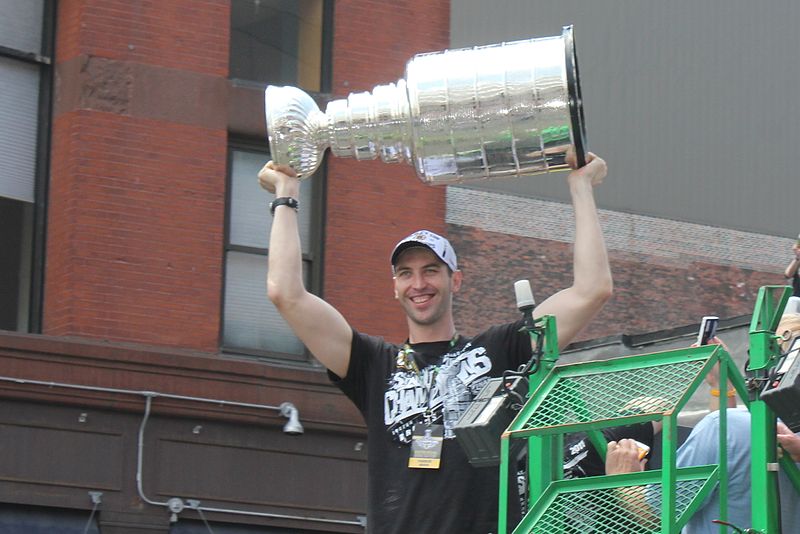Delay of Game
NHL playoffs set to begin
Matthew Reid via Wikimedia Commons
Boston Bruins captain and defenseman Zdeno Chara hoists the Stanley Cup on June 18, 2011 during a victory parade in Boston
For hockey fans all over the world, one of the saddest parts of the COVID-19 pandemic was hearing that the National Hockey League suspended the regular season indefinitely on Thursday, March 12. The energy within the NHL teams and fanbases was at a high before the suspension, mainly because the playoffs were within sight. That energy came to a grinding halt when the season was called off.
Now, the move was in the best interest of everyone, taken as a cautionary measure to slow the spread of the coronavirus. Although late nights cheering for favorite teams would be missed greatly, fans knew that their safety and the safety of the organization as a whole came first.
That was almost three months ago. However, a recent announcement from NHL commissioner Gary Bettman has sparked a new hope in players and fans alike. On Tuesday, May 26, Bettman announced that the league’s regular season had officially ended, and that the NHL fully intends to bring back playoff hockey in phases. The playoffs certainly have a different structure from seasons past, but the goal is the same nonetheless: to see what team is worthy of the Stanley Cup.
The first phase was meant as a period of isolation. Players, coaches, and staff were instructed to have been self-isolating for as long as possible to speed up the resumption of playoff hockey. The NHL is currently in its second phase, which allows the return to home facilities and beginning of voluntary on and off-ice training. In early July, the plan is to begin formal training camps for the players as part of the third phase. If the second and third phases go according to plan, then phase four will include participating teams traveling to their respective “hub cities” and beginning tournaments.
The NHL has not released specific dates for games to begin. In a video to the public, Bettman said, “At this time, we are not fixing dates because the schedule of our return to play will be determined both by developing circumstances and the needs of the players.” That being said, the postseason is expected to run into the late summer and even early fall of 2020.
Teams qualified for the playoff race based on their points percentage for the regular season (total number of points out of possible points with a win; a win is two points and an overtime/shootout loss is one point). Twenty-four of the league’s thirty-one teams have qualified to play, twelve from the Eastern Conference and twelve from the Western Conference. The seven teams that did not qualify will be entered in the NHL Draft Lottery that is set to begin its first phase on June 26.
The seeding is set as follows: the top four teams from each conference will be given a bye, then play each other round-robin style to determine top-four seeding. The remaining eight teams in each conference will play best-of-five series to determine who progresses and who is eliminated. The four teams in each conference that win their best-of-five series will go on to face the newly seeded round-robin teams in an official first round of playoffs.
One hub city from each conference will be selected to host the postseason games, and among the options are Chicago, Columbus, Dallas, Edmonton, Las Vegas, Los Angeles, Minneapolis/St. Paul, Pittsburgh, Toronto and Vancouver. The cities are being chosen based on factors like population density, arena space, hotel availability, and the rate at which COVID-19 is spreading. It was noted that Canadian cities may be a difficult option as a result of having to self-quarantine for at least two weeks after entering the country.
In short, there are countless changes that have never been seen before in the NHL playoffs. That being said, the 2019-2020 season is sure to be one for the history books.

Maria Wood is a member of the Class of 2022. This is her third year on the Green Wave Gazette since she joined as a freshman. During March of her sophomore...

